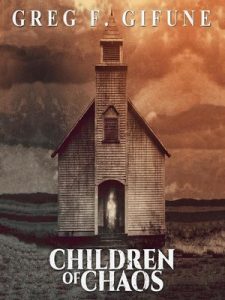
Greg F. Gifune
JournalStone Publishing (May 25, 2018)
Reviewed by Andrew Byers
In Greg F. Gifune’s Children of Chaos, the past becomes an inescapable specter, haunting the present with its sinister secrets and unrelenting grip. Gifune, a virtuoso of psychological horror, embarks on a mesmerizing journey that traverses the treacherous terrain of guilt, redemption, and the forces that compete for influence within the human soul.
The narrative unfolds against the backdrop of a torrential downpour, as three teenage best friends—Phil, Jamie, and Martin—stumble upon a mysterious stranger cloaked in scars, whose presence catalyzes a chain of violent events that will irrevocably alter their lives. Three decades later, haunted by the memories of that fateful encounter, the trio find themselves ensnared in the suffocating tendrils of their past. By that point, their lives have altered unimaginably from the boys they once were: Jamie has become a Catholic priest; Martin, the victim of severe mental illness, has disappeared somewhere in Mexico to found a frightening cult; and Phil, a divorced alcoholic, who has become a failure as a husband, father, writer, and friend, is called upon to journey to Mexico to find Martin and see if he can be brought back to receive the help that he needs and be reunited with his dying mother. Phil’s journey, both physical and spiritual, and what he finds in Mexico, forms the heart of the novel. It is disturbing and compelling and utterly savage. I enjoyed it immensely and appreciated that it hints at far more about the nature of reality than it explicitly states.
As the narrative unfurls, Gifune deftly explores the interplay between past traumas and present-day turmoil, weaving a tapestry of suspense and introspection. From the seedy streets of Tijuana to the desolate expanse of the Corridor of Demons, the journey becomes a visceral odyssey into the heart of darkness, where salvation hangs precariously in the balance.
Children of Chaos is, of course, Gifune’s take on Conrad’s Heart of Darkness, as he states in his final author’s note, with more than a little of the savage brutality and sheer amount of death from Apocalypse Now. Because this is a Gifune novel, it would likewise not be complete without the meditation on good and evil, and spirituality, free will, and destiny that we have come to expect from so much of Gifune’s work.
Gifune’s masterful storytelling prowess is on full display here. Phil in particular is a troubled soul whose life has not gone as planned. Deeply conflicted, he is torn between wanting to help a childhood friend and needing to preserve his own life and what little wellbeing he has left. We know less about Martin and Jamie, but both have important roles to play in what almost seems like a foreordained drama.
The atmospheric richness of Children of Chaos is a testament to Gifune’s narrative dexterity, as he conjures a world steeped in foreboding and menace. The desolate landscapes of both Tijuana and the Mexican desert serve as a haunting backdrop to the characters’ descent into madness and terror.
Pacing, a crucial element in psychological horror, is expertly calibrated in the novel. Each twist and turn of the plot unfolds with meticulous precision, ratcheting up the tension to a fever pitch as the characters hurtle towards their apparent destiny, an inexorable reckoning. The relentless momentum of the narrative ensures that readers are gripped by an unyielding sense of dread and foreboding for what’s to come.
Greg F. Gifune’s Children of Chaos is a tour de force that has not yet received the attention that it deserves. For aficionados of the genre seeking a gripping and immersive tale, Children of Chaos is an unmissable odyssey into the abyss—an electrifying descent into the heart of darkness that will linger in the reader’s mind long after the final page is turned.
Definitely recommended.
- Book Review: BLACK SEAS OF INFINITY - July 24, 2024
- Book Review: THE SECRET LANGUAGE OF SPIDERS - July 3, 2024
- Book Review: GODS OF A NAMELESS COUNTRY - May 2, 2024
- Book Review: LIVING IN CEMETERIES - April 26, 2024
- Book Review: BABYLON TERMINAL - April 22, 2024
- Book Review: ORPHANS OF WONDERLAND - April 8, 2024
- Book Review: CHILDREN OF CHAOS - April 4, 2024
- Book Review: RAZORED LAND - April 2, 2024
- Book Review: FALLS THE DARKNESS - January 29, 2024
- Book Review: DEEP NIGHT - January 25, 2024


